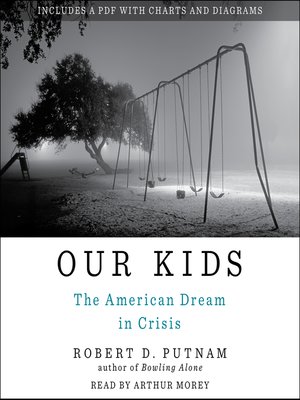
Sign up to save your library
With an OverDrive account, you can save your favorite libraries for at-a-glance information about availability. Find out more about OverDrive accounts.
Find this title in Libby, the library reading app by OverDrive.



Search for a digital library with this title
Title found at these libraries:
| Library Name | Distance |
|---|---|
| Loading... |
A New York Times bestseller and "a passionate, urgent" (The New Yorker) examination of the growing inequality gap from the bestselling author of Bowling Alone: why fewer Americans today have the opportunity for upward mobility.
Central to the very idea of America is the principle that we are a nation of opportunity. But over the last quarter century we have seen a disturbing "opportunity gap" emerge. We Americans have always believed that those who have talent and try hard will succeed, but this central tenet of the American Dream seems no longer true or at the least, much less true than it was.
In Our Kids, Robert Putnam offers a personal and authoritative look at this new American crisis, beginning with the example of his high school class of 1959 in Port Clinton, Ohio. The vast majority of those students went on to lives better than those of their parents. But their children and grandchildren have faced diminishing prospects. Putnam tells the tale of lessening opportunity through poignant life stories of rich, middle class, and poor kids from cities and suburbs across the country, brilliantly blended with the latest social-science research.
"A truly masterful volume" (Financial Times), Our Kids provides a disturbing account of the American dream that is "thoughtful and persuasive" (The Economist). Our Kids offers a rare combination of individual testimony and rigorous evidence: "No one can finish this book and feel complacent about equal opportunity" (The New York Times Book Review).
Central to the very idea of America is the principle that we are a nation of opportunity. But over the last quarter century we have seen a disturbing "opportunity gap" emerge. We Americans have always believed that those who have talent and try hard will succeed, but this central tenet of the American Dream seems no longer true or at the least, much less true than it was.
In Our Kids, Robert Putnam offers a personal and authoritative look at this new American crisis, beginning with the example of his high school class of 1959 in Port Clinton, Ohio. The vast majority of those students went on to lives better than those of their parents. But their children and grandchildren have faced diminishing prospects. Putnam tells the tale of lessening opportunity through poignant life stories of rich, middle class, and poor kids from cities and suburbs across the country, brilliantly blended with the latest social-science research.
"A truly masterful volume" (Financial Times), Our Kids provides a disturbing account of the American dream that is "thoughtful and persuasive" (The Economist). Our Kids offers a rare combination of individual testimony and rigorous evidence: "No one can finish this book and feel complacent about equal opportunity" (The New York Times Book Review).







